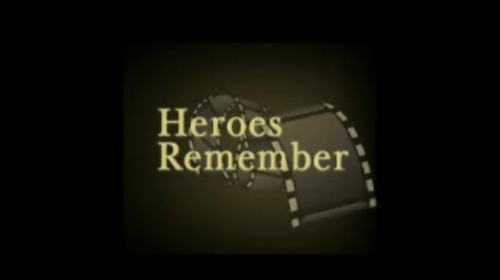Only 75 of them came out
The Battle of Passchendaele
Only 75 of them came out
Transcript
Sign at tthe bottom of a ditch.
Christmas in ‘17 down in Souchez Valley there, had there a lot ofFence post along a trench line.
snow there. Go down to shave and had to dig, break the ice downSoldiers washing thier feet along the edge of a canal.
in the little pot hole there to shave with and damn it was,Soldiers marching into the trench lines.
it was cold. So right after Christmas the battalion moved up toServicemen huddled together while snow falls.
the Ypres front. That was the second gas attack up there.Bombs being place on the ground.
The Battalion went in, oh, about 700 strong (inaudible) and cameSoldiers starting an attack, running towards no-man's land.
out with what, only seventy-five, I think it was, that came out. Oh, it was disgraceful to send them in under those conditions.Hard rain falling on two soldiers in a field.
There is more fellas that, there was many fellows died thatFlooded trenches after the rainstorm.
slipped into a shell hole and couldn’t get out, got drowned that got shot. The big, the top guys that forced that battle onto theSoldiers wearing their raingear.
Troops moving supplies through the thick mud.
troops, by God, they’re the ones that should have been shot.Soldiers digging out the trenches.
God, it was ridiculous. The horses couldn’t move, couldn’t pull the guns up. You couldn’t walk hardly in that there chalk. It wasMen pulling out artillery gun out of the mud.
terrible when it was wet. Yes, it was ridiculous to try to sendSoldiers pulling out truck stuck in the soft earth.
troops over under those conditions. You couldn’t stand up hardly.Picture of soldiers wearing their jackets while sitting on the mud.
Description
Mr. Skeates describes the harshness of the front after joining the 46th Battalion, and describes the losses at Ypres.
Charles Darwood Skeates
Charles Skeates was born in Ingersoll, Ontario on February 3, 1894. He worked as a barber until his enlistment at Swift Current, Saskatchewan on March 11, 1916 in the 209th Unit, 4th Infantry, despite his original hopes to be called into the cavalry. Arriving overseas in England in October, 1916, he joined the 9th Reserve Brigade at Bramshott and then the 128th at Whitley as a band member. He went into action as a member of the 46th Battalion, 10th Brigade. Mr. Skeates saw action in several major offensives; Passchendaele, Valenciens, Amiens, Drury Mill where he was wounded, and the Oppy Front. Mr. Skeates was a machine gunner during his tour of duty. After the war, he resumed his work as a barber and married Bessie Becker Maitland, on June 13, 1921. During the Second World War, he served as a barber with the RCAF in England, and finished his military service in 1968 after a 13 year stint in the Canadian Army. Mr. Skeates died on December 5, 1982.
Meta Data
- Medium:
- Video
- Owner:
- Veterans Affairs Canada
- Duration:
- 1:36
- Person Interviewed:
- Charles Darwood Skeates
- War, Conflict or Mission:
- First World War
- Location/Theatre:
- Europe
- Battle/Campaign:
- Passchendaele
- Branch:
- Army
- Units/Ship:
- 209th Unit
- Rank:
- Private
- Occupation:
- Gunner
Attestation
Related Videos
- Date modified:



